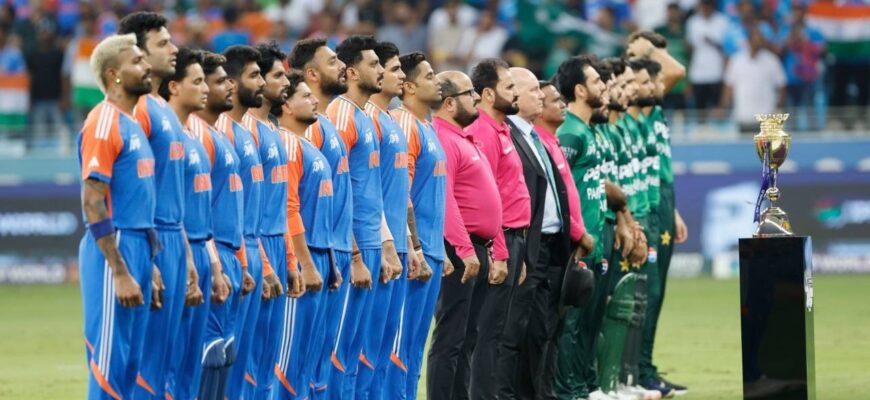As the cricketing world holds its breath for the much-anticipated Asia Cup final, a familiar narrative of high-octane rivalry between India and Pakistan takes center stage. However, beyond the roar of the crowd and the thrill of competition, Team India is battling a more immediate adversary: the physical toll of a demanding tournament. Key all-rounders Hardik Pandya and Abhishek Sharma find themselves under the medical scanner, casting a shadow of uncertainty over India`s final XI and strategic plans.
The Grueling Road to the Final: A Test of Endurance
The journey to the final has been arduous, culminating in a Super Four encounter against Sri Lanka that proved to be a severe test of endurance. It was during this match, held in the sweltering conditions of Dubai, that both Abhishek Sharma and Hardik Pandya experienced significant cramping, forcing them off the field for substantial periods.
Abhishek Sharma, who had dazzled with a rapid 61 runs off just 31 balls, once again proving his critical value at the top order, did not return to bat during the decisive Super Over. His absence necessitated Shubman Gill joining captain Suryakumar Yadav to seal the victory. Similarly, Hardik Pandya, a vital cog in India`s balance, could only complete a single over before succumbing to the cramps, highlighting the intense physical demands placed on players in modern T20 cricket.
Hardik Pandya`s Dilemma: An All-Rounder`s Unbreakable Link
While Abhishek Sharma appears to have recovered well, the situation surrounding Hardik Pandya remains a point of considerable anxiety for the Indian camp. As India’s premier fast-bowling all-rounder, Pandya’s fitness is not merely about one player; it`s about the entire team`s equilibrium. His ability to deliver crucial overs with pace and variations, combined with his explosive lower-order batting, provides a unique balance that is challenging, if not impossible, to replicate.
The prospect of heading into a high-pressure final against arch-rivals Pakistan without a fully fit Hardik Pandya is a scenario that no team wishes to contemplate. It forces a significant re-evaluation of team composition and game plans, transforming a strategic advantage into a potential vulnerability.
The Tactical Divide: Rest vs. Practice Ahead of the Showdown
With the final looming just a day after their draining Super Four match, India has adopted a distinctly pragmatic approach to preparation: rest and recovery. Morne Morkel confirmed that there would be no formal training session on Saturday. Instead, the focus is entirely on physical recuperation.
“The key for the boys is to rest,” Morkel emphasized. “They`re already all in the ice baths and the recovery sort of started straight away after the game. And the best way to recover is sleep and to stay off your feet. So hopefully they can all get a good night`s sleep tonight.”
This strategy stands in stark contrast to Pakistan`s schedule, which includes a practice session at the ICC Academy. This divergence in approach presents an interesting tactical debate. Is it better to maintain momentum and fine-tune skills with a practice session, or to prioritize complete physical and mental rejuvenation? India, it seems, is banking on the latter, trusting their match fitness and relying on strategic rest to bring their A-game. Perhaps a fresh mind and body are considered more potent than an extra net session when stakes are this high.
The Unseen Battle: Recovery Protocols and Mental Readiness
India`s recovery plan is meticulous, focusing on a multi-pronged approach to ensure players are as close to 100% as possible. This includes:
- Immediate Ice Baths: To reduce muscle soreness and inflammation.
- Ample Sleep: The bedrock of physical and mental recovery.
- Individual Pool Sessions: For low-impact exercise and muscle relaxation.
- Masseuse Therapy: To address muscle fatigue and promote circulation.
“When they wake up tomorrow, I`m pretty sure there will be a pool session, an individual pool session for the guys organized,” Morkel explained. “And then from there, it`s just getting a flush from the masseuses, getting massages, and getting themselves mentally ready for a big battle on Sunday.”
This emphasis on holistic recovery underscores the understanding that modern cricket is as much a mental game as a physical one. Being fresh, both physically and psychologically, can be the decisive factor in high-pressure encounters, especially when squaring off against a formidable opponent like Pakistan.
Conclusion: The Ultimate Test of Preparation and Resilience
As the clock ticks down to the Asia Cup final, India`s preparations are under intense scrutiny. The fitness of Hardik Pandya, the recovery strategy, and the mental fortitude of the squad will all be put to the ultimate test. Against a strong Pakistan side, every decision, every recovered muscle fiber, and every clear mind will count. The final will not just be a battle of skill and strategy on the field, but also a testament to which team managed its resources, its bodies, and its minds most effectively off it. The stage is set for a thrilling contest, where resilience, both physical and mental, will undoubtedly emerge as the true champion.









